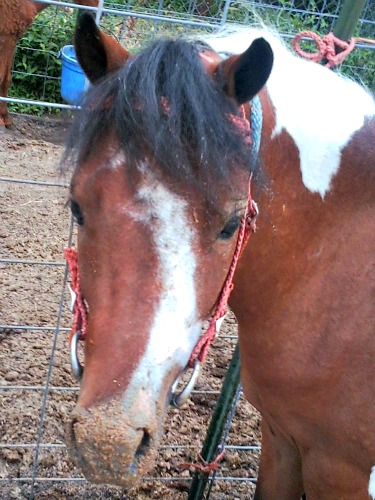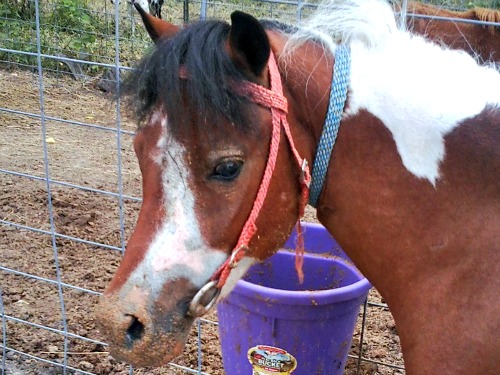NOW, all that said - some of us do feed WET. That means that when we feed our feed to the horses, it gets water added and that water sits long enough to soak in but is NOT fermented in any way, shape, form or fashion.
I love feeding wet. I feed dehydrated, pelleted feeds (Nutrena Safe Choice Original and Southern States Alfalfa pellets). Since I like to feed our guys "soupy" - they generally get 2x more water added to the feed bucket as feed. Some of ours seem to get A LOT OF FEED - but it expands due to the water. It adds both volume and weight but not extra nutrients (that is determined by the amount of feed you have in the bucket before adding water). During the winter, I often have ponies "singing" to me - I feed HOT water in the feed and they LOVE it. It is hot soup for them and a cool soup in the summer. Some make quite the mess!
Wizard, below, makes a mess when he's not wearing a bit as well. Just happened to take this pic as it was his first time wearing a bit/bridle. Note he has wet feed in his forelock and on his neck, too. He just gets gross!


Currently, due to schedule(s) and having many more ponies and no-one helping out (daughters moved out/on) - I've started feeding those same pelleted feeds - dry. Takes a lot less work, a lot less time, I'm not tying the ponies up individually at the moment (at least not most of them). However, I'm noticing a lot of coughing whenever we haven't had rain and the humidity is lower and the 3 foals especially seem to have regular "choking" incidents (coughing - not an actual Horse Choke - though that is a concern since our older ponies are so used to eating this feed wet). I'm not liking that. Also, since we are essentially "free feeding", I've now got ponies that are at the right weight, some VERY round and others in the same paddocks that are too "lite" and/or downright ribby. SO, I will probably go back to catching each pony and tying them at their buckets and feeding wet - at least on the days that I'm not working...
That same pony above - feeding him dry right now - he's lost a ton of weight. He often leaves his feed bucket and won't eat it. He's an embarrassing, walking rib cage at the moment (happened in less than 60 days) - and I haven't seen enough fence running/pacing to say it's because he's being "studdy" (he is running with a mare at the moment - he lets her eat all the feed). So, this arrangement will be changing... Have to put his pen back together to do it - our arab mare flipped backwards over his pen fence and I haven't repaired it yet - he's been in a different pen with the shetland mare.
I am not feeding beet pulp right now, but considering going back to it, at least for a few individual ponies. Years ago, when I first started feeding it - the directions stated right on the bag that it needed to soak several hours (over night would work) and that is what I did. During the hottest days of summer - it sat in our laundry room to keep it from fermenting/turning sour (OMG - the scent would turn my stomach when it started to turn!!). If left out in the barn, wet/soaking, it would actually turn moldy in just 24 hours from June - September. I set it up in the evenings to feed in the mornings - but if I cut my time by not adding it to the feed - the beet pulp would be bad by that evening. During the winter - the buckets of soaked beet pulp would sit overnight in our laundry room and I carried it out in the AM to feed with hot, soupy wet feed. Then directions on the bag changed - now says only need about 30 minutes of soak time. Beet pulp will expand at least 2x it's dehydrated state - sometimes more. On some horses, it worked great for adding weight - on others it worked for reducing weight and I've had several over the years that wouldn't touch it no matter how you fed it - from mini horses up to draft horses. They also now make pelleted beet pulp - I always used the regular shredded type. When available - we got it with NO molasses added. Funny - it costs more to get that way. You can't get the beet pulp pellets anywhere around us (75 mile radius) w/o molasses. Not sure - they may not make the pelleted beet pulp with no molasses.





